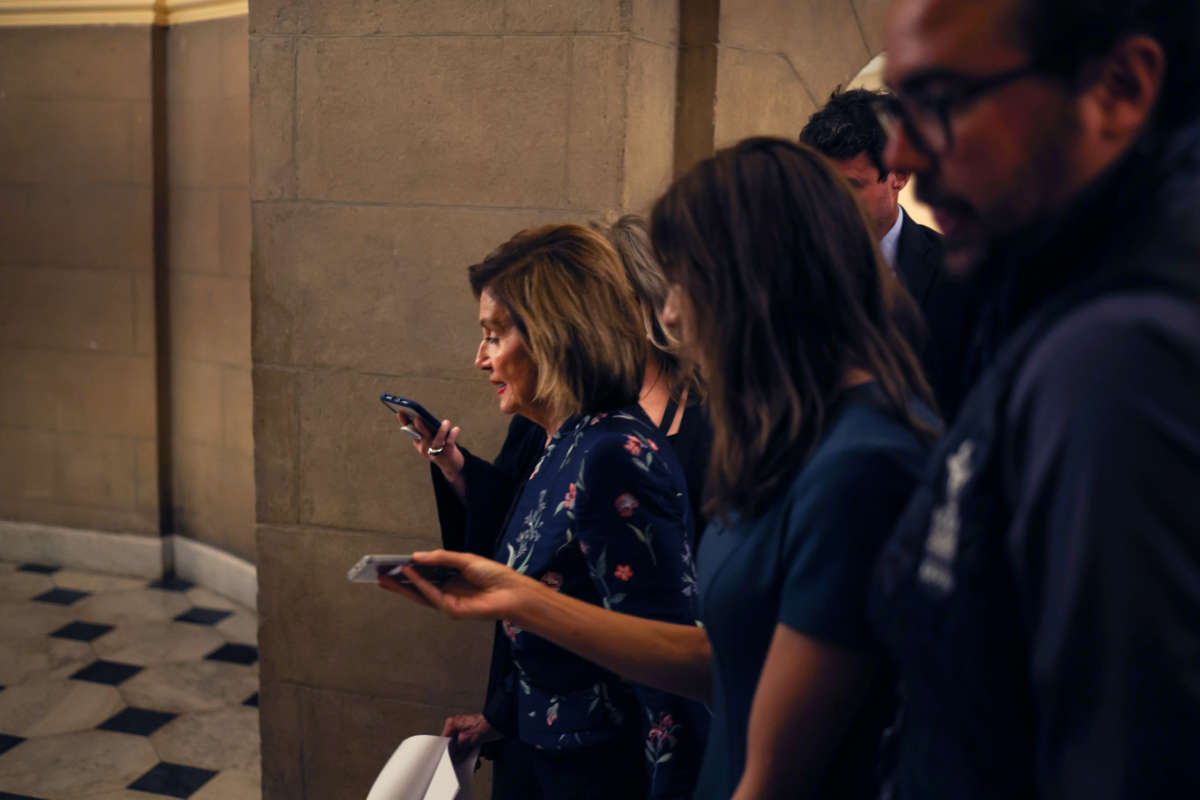Over the past months, the Democratic caucus in Congress has struck a careful, if tenuous, balance within the party and its allies. The agreement is that the bipartisan infrastructure bill, largely influenced by Republicans, can pass as long as the $3.5 trillion reconciliation bill, with many Democratic priorities, passes alongside it.
Though it took some cajoling, progressives were swayed to support the infrastructure bill because of moderate Democrats’ insistent support of the bipartisan bill, with the only caveat being that items like climate action aren’t cut from the reconciliation package. Even the moderate House Speaker Nancy Pelosi (D-California) has agreed to this plan, saying that she won’t bring the infrastructure bill, which progressives have panned, to a vote until the reconciliation bill is passed.
But moderate Democrats evidently aren’t satisfied with their ability to pass a far-reaching, consequential bill containing many of the party’s priorities, given to them by the Senate’s unusual passage of both bills this week. According to Politico, a handful of centrist Democrats are conniving to sink the plan carefully crafted by party leadership to satisfy the caucus, President Joe Biden, the public, and even some Republicans seeking to pass the bipartisan bill.
Pelosi is currently planning to workshop and pass the reconciliation bill and the infrastructure bills by the end of September, before certain funding programs are set to expire. If Pelosi brings the infrastructure bill to a vote this month without substantial movement of the reconciliation bill, progressives have promised to reject its passage.
“Pelosi’s timetable hasn’t assuaged a small group of frustrated Democratic moderates who are plotting ways to convince her and her team to change course,” reports Politico. “At least six of those centrists say privately they are willing to block consideration of the Democrats’ budget blueprint as a last-ditch move to stall the $3.5 trillion bill, according to two people familiar with the discussions.” Democrats hold the majority in the House by only three votes.
What the unnamed moderates want instead, it seems, is to pass the infrastructure bill now, with no mention of the reconciliation bill about which the conservative Sen. Joe Manchin (D-West Virginia), somewhat of a ringleader of centrist thought, has raised concern. Their worry is that the public may forget about President Joe Biden’s so-called victory on the infrastructure negotiations by September.
“I believe we need to take an immediate vote on the infrastructure legislation that we have in front of us,” Rep. Stephanie Murphy (D-Florida), who co-leads the centrist Blue Dog Coalition, told Politico. The House should not “hold the infrastructure bill hostage to the yet-developed reconciliation bill,” Murphy said.
While it’s true that the reconciliation bill has yet to be fully fleshed out, Democrats have released a relatively detailed blueprint of the legislation. It contains long-vaunted Democratic priorities like a Civilian Climate Corps, Medicare expansion, guaranteed medical leave, funding for affordable housing, and much more. Sen. Bernie Sanders, who led the bill, has called it “the most consequential piece of legislation for working people, the elderly, the children, the sick and the poor since FDR and the New Deal of the 1930s.”
Many of the proposals in the reconciliation are of vital and timely importance as COVID-19 sweeps the country yet again and the climate crisis is revealed to be accelerating more rapidly than scientists previously thought. And many of the proposals, outside of the reconciliation process, would be or have already been blocked by Republicans, who carved things like climate and affordable housing nearly entirely out of the bipartisan infrastructure bill.
As Rep. Cori Bush (D-Missouri) pointed out on Twitter on Wednesday, there are more progressives who have threatened to vote against the infrastructure bill if the reconciliation bill is watered down than there are centrists who want to pass the infrastructure bill immediately.
The reconciliation bill is already a compromise for progressives, some of whom wanted a $10 trillion climate and justice bill in place of Biden’s infrastructure bill. In an internal survey of the Congressional Progressive Caucus, a majority of the group’s 96 House members said they’d reject the bipartisan bill without a sufficient reconciliation package.
“There are MANY more of us demanding that the only way the bipartisan bill gets a vote in the House is if we do not miss the chance to invest in our communities with a $3.5 trillion reconciliation bill,” tweeted Bush. “This was already the compromise. We must deliver what we promised.”
The centrists seeking to change course on this plan, then, seem to be ignoring the delicate balance that Democratic leaders have struck between progressives and the more conservative part of their caucus. As Politico reported in an interview with Senate Majority Leader Chuck Schumer (D-New York), the Senate leader has worked to get both Manchin and Sanders to support each other’s bills, contingent on both bills passing.
It’s yet unclear what moderates are angling for, but their plan to rush the infrastructure bill separately from the reconciliation bill would surely fail with dozens of progressives standing against them — a show, perhaps, of the growing power of progressives within Congress. Surely even Pelosi, who tends to be especially precious about moderates in her party, understands that.
Media that fights fascism
Truthout is funded almost entirely by readers — that’s why we can speak truth to power and cut against the mainstream narrative. But independent journalists at Truthout face mounting political repression under Trump.
We rely on your support to survive McCarthyist censorship. Please make a tax-deductible one-time or monthly donation.
